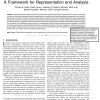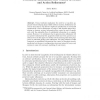1235 search results - page 39 / 247 » Formalizing information security knowledge |
109
click to vote
EKAW
2000
Springer
15 years 6 months ago
2000
Springer
Designing a terminological knowledge base consists in collecting terms and associating them to their definition. Our objective is to define a process model to support this design ...
103
click to vote
CISC
2005
Springer
15 years 8 months ago
2005
Springer
The formal analysis of cryptographic protocols has developed into a comprehensive body of knowledge, building on a wide variety of formalisms and treating a diverse range of securi...
104
click to vote
ESWA
2008
15 years 2 months ago
2008
A good legal knowledge representation system, capable of effectively providing investors with comprehensive legal knowledge, is needed for investors to prevent erratic behavior be...
120
click to vote
TSE
2008
15 years 2 months ago
2008
This paper presents a framework for security requirements elicitation and analysis. The framework is based on constructing a context for the system, representing security requireme...
133
click to vote
ETRICS
2006
15 years 6 months ago
2006
Abstract. Formal methods emphasizes the need for a top-down approach when developing large reliable software systems. Refinements are map step by step abstract algebraic specificat...


